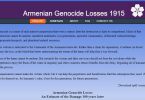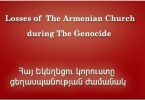At the request of my colleague from the American University of Armenia, visiting professor Yair Auron, I prepared a short address on occasion of this important conference, which I am sincerely sorry I cannot attend due to unexpected urgent matters.
We live in times where our capacity for destruction often exceeds our capacity for understanding, tolerance and restraint. Intervention, when and if it comes, is often too little, too late. Remedy and repair are inadequate and often indefinitely postponed. Under these circumstances, prevention and deterrence appear to be the best cure for the scourge of genocide. Yet we falter even with these. Deterrence requires universal cognizance that there are some things human beings cannot do to other human beings and get away with it. Impunity for genocide breeds more genocide. Each time such horrors are inflicted on our species, our species is scarred and deformed. Worse still, if we do nothing about it, it becomes the new norm, doubling the crime. We pronounce lofty norms, but we do not enforce them. This makes a sham of the law, while lulling us into a false sense of security and righteousness. Yet violent realities jolt us, and in more lucid moments we shudder at the realization that today the de facto norm is that genocide pays, and the irresponsibility of the powers-that-be made it so.
Genocide is crime against humanity, and like all crimes it must be addressed by the community in defense of the community’s own safety and integrity. Tragically, self-interest weakens resolve and bends principles. Hence a century later, the beneficiaries of the Armenian Genocide continue to extract profit from the crime. Those beneficiaries are not just the perpetrators and their allies but many other indifferent or self-interested bystanders who myopically place their profit ahead of the well-being of our species, coarsening our common humanity and leaving the world a worse place for future generations. In pursuit of the petty advantages and rivalries of the day, they imperil their own children and grandchildren. This is the world that the powers-that-be have made and try desperately to sustain, but it is unsustainable. Wrongs not timely corrected do not go away. They compound. There is no escape from the downward spiral of dehumanization other than to end the world’s addiction to covering up horrific wrongs, its penchant for engaging in quid-pro-quo politics, and its self-indulgent living at the expense of victims of crime and injustice. This addiction condemns us all – perpetrators, victims, beneficiaries, bystanders – to be hostages of the past. It is time to give perpetrators and beneficiaries another opportunity to mend their ways, to rectify injuries, to atone for wrongs, and to restore balance to a world that is spinning out of control. Calling things by their right name is a first step toward creating such opportunities for restoring humanity to health and sanity.
I thank Yair Auron for inviting me to address this conference and commend you all for efforts to raise
awareness about genocide and seek remedies for man’s inhumanity to man.
Thomas Samuelian
Dean, College of Humanities & Social Sciences
American University of Armenia
November 1, 2015






